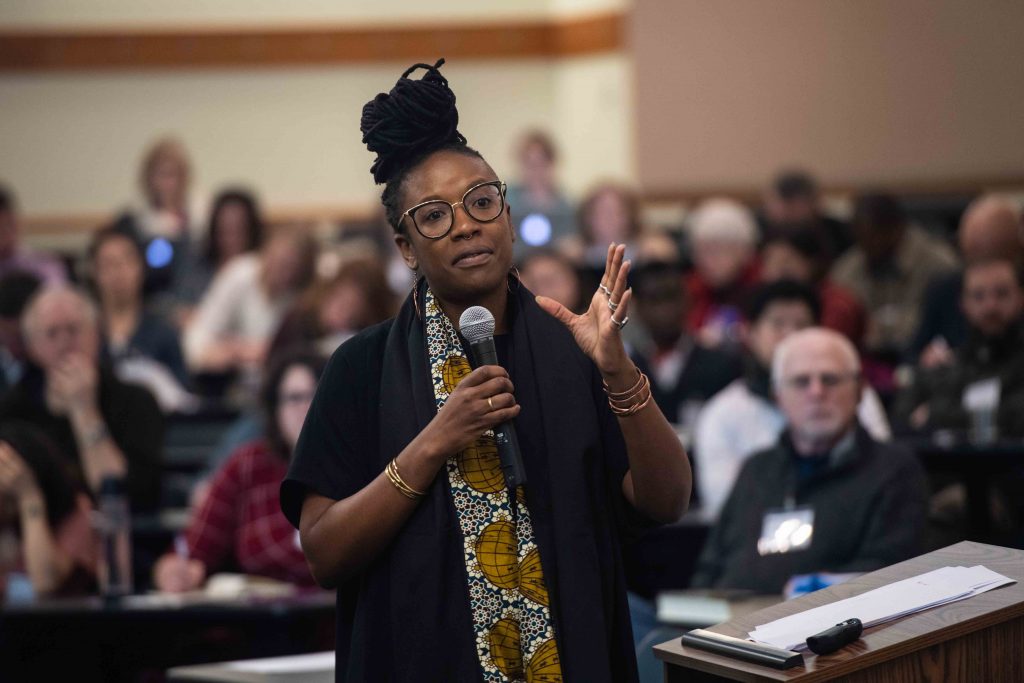A conference on the problems and solutions related to the ceaseless movement of some 244 million people around globe was held at Boston College Law School April 11 and 12. It brought together more than 250 participants, among them eminent scholars Marcelo Suarez-Orozco and E. Tendayi Achiume and humanitarians Sean Callahan and Thomas H. Smolich, SJ.
The interdisciplinary gathering was a joint effort of Boston College’s law and social work schools and was designed to promote conversation between lawyers and social workers who engage with immigrants, refugees, detainees, and their families, and who are shaping and reforming research, policy, and practice in the area of global migration.
“Borders are the source of ethical conundrums,” said opening keynoter Achiume, capturing in a nutshell the essence of the conference’s concerns. An assistant law professor at the University of California-Los Angeles and the UN Special Rapporteur on Contemporary Forms of Racism, Racial Discrimination, Xenophobia, and Related Intolerance, she went on to explore the lasting impact of imperialism and colonialism on modern populations, a topic she called “De-Imperial Migration.”
The situation has created an enduring political and economic interdependence between first and third world countries, she explained, leaving the once-subjugated still “bound and subordinate.” Given that relationship, she argued, the first world has no right to exclude the third world persons who are part of that relationship.
Achiume said borders are often treated as “immoveable facts” rather than mere remnants of imperial decision-making.
As an example, she pointed to Libya, a launching point for migrants hoping to reach European shores, and observed that the European Union is “banning together to keep people out” and then exercising “extreme politics of exclusion” when migrants set foot onto the continent. In many European countries it is a crime to rent property to someone who does not have legal status, she said. Similarly, the healthcare systems in countries such as England are geared toward disenfranchising migrants, withholding medical treatment to those who cannot prove their status.
Turning to the United States, Achiume reminded the audience that the immigration situation has not always been as it is today. To the contrary, she said, “for much of the 20th century, freedom of movement was encouraged by the West, for economic reasons.” Today, Americans are often encouraged to view non-Europeans as “uncivilized,” a means of “stripping migrants of their identity.”
In his afternoon address, “Humanitarianism and Mass Migration,” author and psychological anthropologist Suárez-Orozco, the UCLA Wasserman Dean of the Graduate School of Education and Information Studies, talked about the global impact of inclusion and exclusion on migration.
Beginning with a biological account of migration, Suárez-Orozco called migration “an ancient human adaptation, encoded in our bodies.” Even in the modern era, migration is “conspicuous of the human condition, a shared condition of our humanity,” he said.
Though all continents are involved in the movement of people, he observed, a vast majority of migrants live within twenty countries. The United States houses the largest number. Additionally, frenetic media coverage aside, the rate of migration has been fairly stable for the last five decades; yearly, 2.5 to 3.3 percent of people migrate across international borders, he noted.
The most striking aspect of Suárez-Orozco’s remarks was the impact that migration has on children. Globally, one in eight migrants are children. One in every 200 children is a refugee, twice as many as a decade ago. Though large-scale migration is not random and is focused on the family, he said, for many children migration to a new country is paramount to “migration to a new family.” The very nature of migration often leads to children ending up with relatives or family friends, leaving one or both parents behind and being separated from siblings.
Referencing the effects climate change will have on migration, the impact of President Trump’s rhetoric surrounding his border wall, and international catastrophes such as Syria, Suárez-Orozco stressed the need to become aware of our history so we are better prepared to rise to the challenges of the present. “We live looking forward,” he concluded, “but only understand by looking back.”
During the conference’s second day, Callahan, president and CEO of Catholic Relief Services, and Father Smolich, international director of Catholic Relief Services, shared a panel on humanitarian responses to migration.
The latter immediately debunked the prevailing narrative about refugees, saying the problem lies not with the them but with the systems and lack of leadership they confront. “I don’t think we have a refugee crisis,” he stressed. “I think we have a management crisis. I think we have a spiritual crisis, but 7 million people should be able to figure out a way of supporting and making sense of 68 million.”
Callahan agreed and added that we have a crisis of narrative. “The false narrative that’s going around is the real crisis that many of us face,” he said.
Among the other dozen or so conference topics were international approaches to migration control, whether migration helps or hurts the national labor market, new models of interdisciplinary collaboration, and immigrant rights and public benefits.
BC’s Office of Continuing Education was a partner in the conference.


